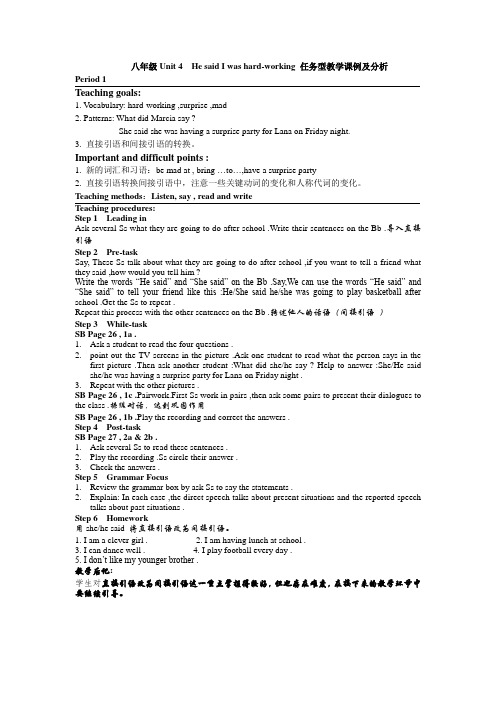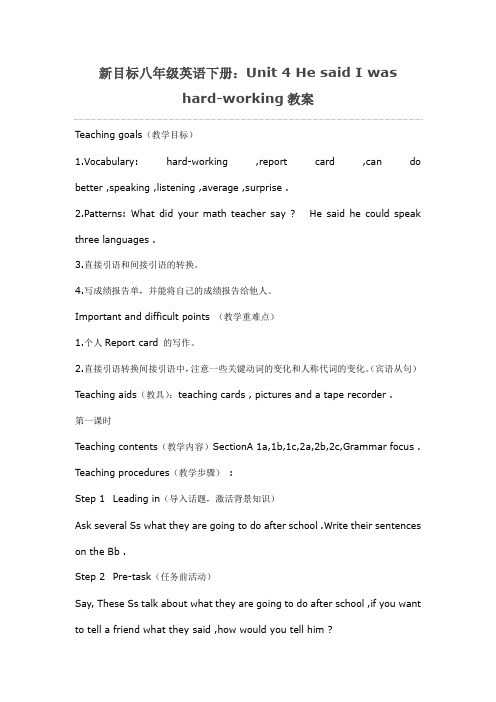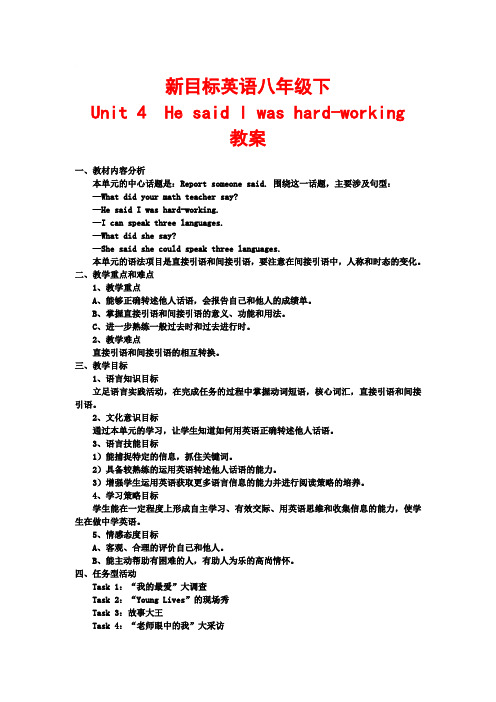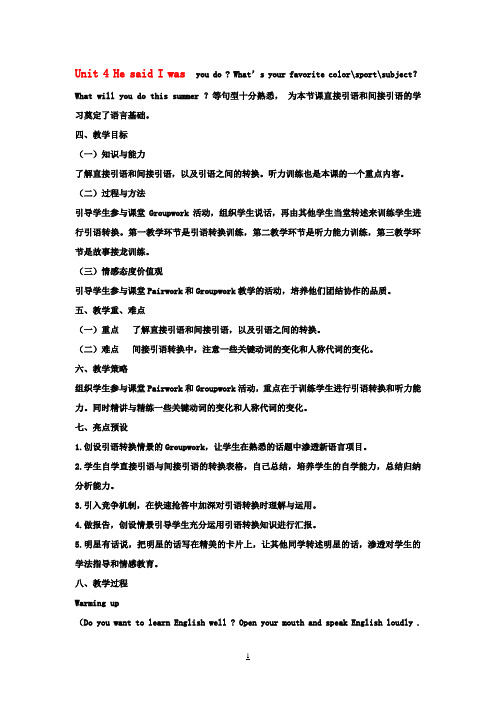八年级下册英语 UNIT 4 He said I was hard-working. 第一节 导学案
- 格式:doc
- 大小:57.50 KB
- 文档页数:2

Unit4 He said I was hard-working自学目标:(1)知识目标:A.掌握重点词汇 B、掌握语法:直接引语变间接引语(2)能力目标:通过听力理解,学习如何使用间接引语。
(3)情感目标:学习将别人的话间接地转告给第三者学会去做一个乐于服务于别人的人。
学习重点:直接引语变间接引语学习难点:主句是过去时的间接引语中时态的变化导学内容:一.预习课本,把下列短语译成英语1.肥皂剧_____________ 2. 给你举办一个惊喜的晚会_____________3. 对…恼火____________4.不再_____________预习新语法:㈠概念:1.直接引语是指,把它放在引号内。
2.间接引语即,被转述的话不放在引号内。
㈡直接引语变间接引语:①“I want the blue one.”he told us. “我想要蓝色的。
”→He told us that he wanted the blue one.他说他想要蓝色的。
②She said to me,“I like it very much.”她对我说:“我非常喜欢它。
”→She told me that she liked it very much. 她对我说她非常喜欢它。
【总结1】直接引语如果是陈述句,变间接引语是,用引导(口语中常省略)。
He said to me,“I broke your CD player.”→He said to me that he had broken my CD player.【总结2】直接引语变间接引语时会发生相应变化。
通常第一、二人称变为第三人称,或者第二人称变为第一人称;限定词也作相应的变化。
【总结3】直接引语变间接引语时时态会发生相应变化。
一般现在时→现在进行时→一般将来时→1.mad adj.①生气的;气愤的构成结构:be mad at sb.=_________意为“生某人的气”eg: 我妈妈很生我的气,因为我没有完成家庭作业。

八年级Unit 4 He said I was hard-working 任务型教学课例及分析Period 1Teaching goals:1. V ocabulary: hard-working ,surprise ,mad2. Patterns: What did Marcia say ?She said she was having a surprise party for Lana on Friday night.3. 直接引语和间接引语的转换。
Important and difficult points :1. 新的词汇和习语:be mad at , bring …to…,have a surprise party2. 直接引语转换间接引语中,注意一些关键动词的变化和人称代词的变化。
Teaching methods:Listen, say , read and writeTeaching procedures:Step 1 Leading inAsk several Ss what they are going to do after school .Write their sentences on the Bb .导入直接引语Step 2 Pre-taskSay, These Ss talk about what they are going to do after school ,if you want to tell a friend what they said ,how would you tell him ?Write the words “He said” and “She said” on the Bb .Say,We can use the words “He said” and “She said” to tell your friend like this :He/She said he/she was going to play basketball after school .Get the Ss to repeat .Repeat this process with the other sentences on the Bb .转述他人的话语(间接引语)Step 3 While-taskSB Page 26 , 1a .1.Ask a student to read the four questions .2.point out the TV screens in the picture .Ask one student to read what the person says in thefirst picture .Then ask another student :What did she/he say ? Help to answer :She/He said she/he was having a surprise party for Lana on Friday night .3.Repeat with the other pictures .SB Page 26 , 1c .Pairwork.First Ss work in pairs ,then ask some pairs to present their dialogues to the class .操练对话,达到巩固作用SB Page 26 , 1b .Play the recording and correct the answers .Step 4 Post-taskSB Page 27 , 2a & 2b .1.Ask several Ss to read these sentences .2.Play the recording .Ss circle their answer .3.Check the answers .Step 5 Grammar Focus1.Review the grammar box by ask Ss to say the statements .2.Explain: In each case ,the direct speech talks about present situations and the reported speechtalks about past situations .Step 6 Homework用she/he said 将直接引语改为间接引语。


新目标八年级英语下册:Unit 4 He said I washard-working教案Teaching goals(教学目标)1.Vocabulary: hard-working ,report card ,can do better ,speaking ,listening ,average ,surprise .2.Patterns: What did your math teacher say ? He said he could speak three languages .3.直接引语和间接引语的转换。
4.写成绩报告单,并能将自己的成绩报告给他人。
Important and difficult points (教学重难点)1.个人Report card 的写作。
2.直接引语转换间接引语中,注意一些关键动词的变化和人称代词的变化。
(宾语从句)Teaching aids(教具):teaching cards , pictures and a tape recorder .第一课时Teaching contents(教学内容)SectionA 1a,1b,1c,2a,2b,2c,Grammar focus . Teaching procedures(教学步骤):Step 1 Leading in(导入话题,激活背景知识)Ask several Ss what they are going to do after school .Write their sentences on the Bb .Step 2 Pre-task(任务前活动)Say, These Ss talk about what they are going to do after school ,if you want to tell a friend what they said ,how would you tell him ?Write the words “He said” and “She said” on the Bb .Say,We can use the words “He said” and “She said” to tell your friend like this :He/She said he/she was going to play basketball after school .Get the Ss to repeat . Repeat this process with the other sentences on the Bb .Step 3 While-task(任务中活动)SB Page 26 , 1a .1.Ask a student to read the four questions .2.point out the TV screens in the picture .Ask one student to read what the person says in the first picture .Then ask another student :What did she/he say ? Help to answer :She/He said she/he was having a surprise party for Lana on Friday night .3.Repeat with the other pictures .SB Page 26 , 1c .Pairwork.First Ss work in pairs ,then ask some pairs to present their dialogues to the class .SB Page 26 , 1b .Play the recording and correct the answers .Step 4 Post-task(任务后活动)SB Page 27 , 2a & 2b .1.Ask several Ss to read these sentences .2.Play the recording .Ss circle their answer .3.Check the answers . Step 5 Grammar Focus1.Review the grammar box by ask Ss to say the statements .2.Explain: In each case ,the direct speech talks about present situations and the reported speech talks about past situations .Step 6 Homework(家庭作业)用she/he said 将直接引语改为间接引语。

新目标英语八年级下Unit 4 He said I was hard-working教案一、教材内容分析本单元的中心话题是:Report someone said. 围绕这一话题,主要涉及句型:—What did your math teacher say?—He said I was hard-working.—I can speak three languages.—What did she say?—She said she could speak three languages.本单元的语法项目是直接引语和间接引语,要注意在间接引语中,人称和时态的变化。
二、教学重点和难点1、教学重点A、能够正确转述他人话语,会报告自己和他人的成绩单。
B、掌握直接引语和间接引语的意义、功能和用法。
C、进一步熟练一般过去时和过去进行时。
2、教学难点直接引语和间接引语的相互转换。
三、教学目标1、语言知识目标立足语言实践活动,在完成任务的过程中掌握动词短语,核心词汇,直接引语和间接引语。
2、文化意识目标通过本单元的学习,让学生知道如何用英语正确转述他人话语。
3、语言技能目标1)能捕捉特定的信息,抓住关键词。
2)具备较熟练的运用英语转述他人话语的能力。
3)增强学生运用英语获取更多语言信息的能力并进行阅读策略的培养。
4、学习策略目标学生能在一定程度上形成自主学习、有效交际、用英语思维和收集信息的能力,使学生在做中学英语。
5、情感态度目标A、客观、合理的评价自己和他人。
B、能主动帮助有困难的人,有助人为乐的高尚情怀。
四、任务型活动Task 1:“我的最爱”大调查Task 2:“Young Lives”的现场秀Task 3:故事大王Task 4:“老师眼中的我”大采访Task 5:校园情景剧五、教学过程设计课时结构:Period 1:Section A—1a, 1b, 1c,Period 2:2a, 2b, 2cPeriod 3:Section A—3a, 3b, 4Period 4: Section B—2a, 2b, 2cPeriod 5:Section B—3a, 3b, 3c, 4Self—checkPeriod 6:ReadingPeriod 1.Step 1. Warming upTask 1. Ask and answer questions about the past progressive.T:What were you doing at 7:00 yesterday evening?Were you watching TV at that time?Step 2. Lead inTask 2 watch a play and answer some questions.What was the boy doing?He was looking for his motherWhat did he describe his mother?He said, ‘my mother is the most beautiful woman in the world.’He said his mother was the most beautiful woman in the world.…引出本课的重点句型。

Unit 4 He said I was you do ? What’s your favorite color\sport\subject?What will you do this summer ?等句型十分熟悉,为本节课直接引语和间接引语的学习奠定了语言基础。
四、教学目标(一)知识与能力了解直接引语和间接引语,以及引语之间的转换。
听力训练也是本课的一个重点内容。
(二)过程与方法引导学生参与课堂Groupwork活动,组织学生说话,再由其他学生当堂转述来训练学生进行引语转换。
第一教学环节是引语转换训练,第二教学环节是听力能力训练,第三教学环节是故事接龙训练。
(三)情感态度价值观引导学生参与课堂Pairwork和Groupwork教学的活动,培养他们团结协作的品质。
五、教学重、难点(一)重点了解直接引语和间接引语,以及引语之间的转换。
(二)难点间接引语转换中,注意一些关键动词的变化和人称代词的变化。
六、教学策略组织学生参与课堂Pairwork和Groupwork活动,重点在于训练学生进行引语转换和听力能力。
同时精讲与精练一些关键动词的变化和人称代词的变化。
七、亮点预设1.创设引语转换情景的Groupwork,让学生在熟悉的话题中渗透新语言项目。
2.学生自学直接引语与间接引语的转换表格,自己总结,培养学生的自学能力,总结归纳分析能力。
3.引入竞争机制,在快速抢答中加深对引语转换时理解与运用。
4.做报告,创设情景引导学生充分运用引语转换知识进行汇报。
5.明星有话说,把明星的话写在精美的卡片上,让其他同学转述明星的话,渗透对学生的学法指导和情感教育。
八、教学过程Warming up(Do you want to learn English well ? Open your mouth and speak English loudly .Believe yourself ! Don’t be shy !)Read the chantI am a girl , I am a girl .She said she was a girl .I can sing , I can sing .He said groups of four .(My English is good ! I can speak it well.) Pay attention to the words that will change.(表现好的小组将每人一个精致的小红旗)Conversation 1 : My favoriteA : What is your favorite color\ sport \ subject ?B : My favorite color \ sport \ subject is red \basketball \English……C : What did 2 : I canA : What can you do ? B: I can sing \ dance \play the piano ……C : What did 3: My planA :What will you do this summer ?B : I will go to Qingdao \visit my best friends ……C : What did the grammar :change Direct speech into Reported speechDirect speech 直接引语 Reported speech 间接引语I am mad at Marcia. She said she was mad at Marcia.I am having a party for Lana. She said she was having a party for Lana.I go to the beach every Saturday. He said he went to the beach every Saturday.I will call you tomorrow. He told me he would call me tomorrow the nextday.I can speak three languages. She said she could speak three languages. Read the chart and I can find the rules .(I will remember them.)直接引语变间接引语的方法:一般现在时变为 _____________现在进行时变为 ____________一般将来时变为 _____________1. 动词变化 am \ is ------ are ------ can ------ will ------do ------ go ------ get ------ like ------ enjoy ---- find ----- 2. 代词变化 I ------ my ------ we ------设计意图:通过自学,在总结对比中,提升自己的归纳分析能力。
Unit 4 He said I was hard-working.主备:李云彩(黄鱼圈中学)校对:一、教材分析本单元通过转述别人的话学习直接引语和间接引语,并通过―看肥皂剧转述剧中人的话和向家长转述老师对自己的评价‖这些练习活动,来理解和掌握直接引语和间接引语之间的转换规律。
培养学生学会利用精读和泛读,并能根据上下文推测生词的阅读策略。
提高学生灵活理解和运用词汇的能力,激发和培养学生热爱学习和乐于助人的品质。
二、目标引导(一)重点词汇message, village, area, meter, decision, husband, start, influence, hometown, danger, suppose, copy, ate, return, nervous, true, lucky, own, poor, thin.(二)重点短语1.have a surprise party 举办一个惊喜的聚2.be/get mad at/with sb. 生某人的气3.not…any more 不再4.bring sth. to sw. / sb. 把某物带到某地/某人5.direct speech 直接引语6.reported speech 间接引语7.first of all 首先8.call sb. 给某人打电话9.do a homework projectwork on a homework project 做家庭作业10.at one’s house doing a homework project在……家做作业11.pass sth. to sb.pass sb. sth. 把……传递给……12.pass on… 传递pass sth. on to sb. 把……传递给……13.be supposed to do sth. 被期望或被要求…14.do better in…在……方面做得更好15.be in good health 身体健康16.finish my end – of – year exams 结束年终考试17.report card 成绩单18.get nervous 变得紧张19.in the mail 在邮件中20.have a really hard time with science 自然课学得很吃力21.be surprised to do sth. 做……感到很吃惊22.help sb. do / with sth. 帮助某人做某事23.have a big fight 打了一大架24.talk to sb. 跟某人说话25.have a fight 打架26.start a bad habit 养成/开始坏习惯27.I’m sure that… 我确信……28.get over 克服29.in a poor mountain village 在一个贫穷的山村30.sound like fun to sb. 对你来说听起来是件趣事may not sound like fun to sb. 或许不是你的兴趣所在31.on a one – year program 在为期一年的援助计划中32.the Ministry Education 教育部33.Chinese Y oung Pioneers 中国少年先锋队34.sea level 海平面35.agree with sb. 同意……的观点36.open up one’s eyes 打开……的眼界/ 拓展学生的视野37.make sb. do sth. 使得某人做某事38.care for 照料、照顾39.doctors without borders 没有国界的医生40.wild animals in danger 处于危险中的野生动物(三)重点句型1.She said she was mad at Marcia.2.She said she was having a surprise party for Lana on Friday night.3.He told me he would call me tomorrow.4.She said she could speak three languages.5.It all started when she asked me if she could copy my homework.6.I asked her why she wanted to do that.(四)语法:现在完成进行时直接引语和间接引语(Direct speech and reported speech)(五)话题学会转述别人的话三、重难点解读1.She said she was having a surprise party for Lana on Friday night.她说她准备在周五的晚上为拉娜举办一个惊喜聚会。
Unit 4 He said I was hardworkingPart 1: Teaching designSECTION AGoals To learn toreportwhat someone saidTo learn such words as: first of all Ever, mad, anymore, message, hardworking,surprise party, report cardProceduresWarming up learning about Direct speech and reported speechIndirect Speech (also referred to as 'reported speech') refers to a sentence reporting what someone has said. It is almost always used in spoken English.If the reporting verb (i.e. said) is in the past,the reported clause will be in a past form. This form is usuallyone step backinto the past from the original. Structures Reported speech; Simple past tense; Can for ability TargetlanguageWhat did your math teacher say? He said I was hard working. I can speak three languages. What did she say? She said she could speak three languages. VocabularyEver, mad, anymore, message, hardworking, surprise party, report card first of all Learningstrategies Listening for key words; Self-evaluatingFor example:He said the test was difficult.She said she watched TV every day.Jack said he came to school every day.If simple present, present perfect or the future is used in the reporting verb (i.e. says) the tense is retained.For example:He says the test is difficult.She has said that she watches TV every day.Jack will say that he es to school every day.If reporting a general truth the present tense will be retained.He said, “I live in Paris.”He said he lived in Paris. He said, “I am cooking dinner.” He said he was cooking dinner.He said, “I have visted London twice.”He said he had visited London twice. He said, “I went to New York last week.”He said he had gone to New York the week before. He said, “I had already eaten.” He said he had already eaten.He said, “I am going to find a newjob.”He said he was going to find a new job.He said, “I will give Jack a call.” He said he would give Jack a call. 1a Doing groupworkHello, class! We shall go to watch a soapopera first of all.But l et’s talk about these questionsfirst.What is a sopa opera?What are some of the soap oeras you know?Do you ever watch soap opera?What are some things that happen onsoap opera?Daytime dramas so named because they were originally sponsored by the makers of laundry detergent in the early days of television.Aserialized program usually dealing with sentimentalized family matters that is broadcast on radio or television (frequently sponsored by a pany advertising soap products)A soap opera is an ongoing, episodic work of fiction, usually broadcast on television or radio and most recently on mobile phones. This genre of TV and radio entertainment has been in existence long enough for audiences to recognize them simply by the term soap. What differentiates a soap from other television drama programs is their open-ended nature. ...1b Listening and numberingListen and number the statements [1-4] on page 26 inthe picture.Now you will read the tapescript for the structure of “reported speech”.1c Asking and answeringIn pairs you are to ask and answer about what the people in the soap opera said.Listen and circle true or false for each statement.the top.Listen again. What did the people on TV say? Circle the correct answers. Answers: 1-is; 2-will; 3-am; 4-am; 5-will2c Doing pairworkNow in pairs you will make a conversation about “Young Lives” that you saw last night.Next you are going to read a newspaper story on page 28 and try to fill in the blanks.Ne xt we are going to do some writing practice. Let’s imagine the next episode of “Young Lives” and try to finish the newspaper story on page 28.In groups of four you are going to role play conversations according to the three role play cards on page 28.Closing down by having a quiz on reported speechMary “I love chocolate.”Jill: “Mary said (that) she ___ chocolate.”a.lovedb. lovesc. loving Answer aMary: “I went skiing.”Jill: “Mary said (that) she ___ skiing.”a. wentb. had gonec. have gone Answer bMary: “I will eat steak for dinner.”Jill: “Mary said (that) she ___ eat steak for dinner.”a. willingb. willc. would Answer cMary: “I have been to Sydney.”Jill: “Mary said (that) she ___ to Sydney.”a. had beenb. has beenc. was being Answer aMary: “I have had three cars.”Jill: “Mary said (that) she ___ three cars.a. hasb. has hadc. had had Answer cMary: “I'm going to go to Long Beach.”Jill: “Mary said (that) she ___ going to go to Long Beach.”a. isb. wasc. went Answer bMary: “I don't like spinach.”Jill: “Mary said (that) she ___ like spinach.”a. doesn'tb. don'tc. didn't Answer cMary: “I have never been to London.”Jill: “Mary said (that) she ___ never been to London.”a. hadb. hasc. have Answer aMary: “I was swimming.”Jill: “Mary said (that) she ___ swimming.a. has beenb. had beenc. have been Answer bMary: “I had a cat.”Jill: Mary said (that) she had ___ a cat.”a. haveb. hasc. had Answer cMary: “I can't swim.”Jill: “Mary said (that) she ___ swim.”a. can'tb. couldn'tc. can not Answer bMary: “I won't buy a new car.”Jill: “Mary said (that) she ___ by a new car.”a. won'tb. willc. wouldn't Answer cMary: “I have to do my laundry.”Jill: “Mary said (that) she ___ to do her laundry.”a. hadb. hasc. have Answer a。
Teaching goals:1.Vocabulary: hard-working ,report card ,can dobetter ,speaking ,listening ,average ,surprise .2.Patterns: What did your math teacher say ?He said he could speak three languages .3.直接引语和间接引语的转换。
4.写成绩报告单,并能将自己的成绩报告给他人。
Important and difficult points :1.新的词汇和习语。
2.个人Report card 的写作。
3.直接引语转换间接引语中,注意一些关键动词的变化和人称代词的变化。
Teaching aids : teaching cards , pictures and a tape recorder .Period 2Teaching contents :SectionA 3a ,3b ,4 ,SectionB 2a ,2b ,2c .Teaching procedures :Step 1 Leading inCheck the homework .Ask several students to read their sentences to the class . Step 2 Pre-taskSB Page 28 , 3a .1.Read the article to the class .2.Ask Ss to fill in the blanks on their own .3.Correct the answers .SB Page 28 , Part 4 .Ss work in groups of four to plete the role plays .Ask a fewSs to show their role plays to the class .Step 3 While-taskSB Page 29 , 1a .1.Read the sentences to the class and teach new words .Then ask Ss to check thesentences that are true for themselves .2.Ask one student to read each sentence to the class and ask Ss to raise their handsif they checked that answer .SB Page 29 , 2a & 2b .1.Read the instructions to Ss .Make sure they know what to do .2.Play the recording two or three times .Correct the answers .Step 4 Post-taskSB Page 29 , 2c .Pairwork . In pairs ,get Ss to choose a report card from activity 2b to talk about .Then ask some pairs to present their dialogues .Step 5 HomeworkSB Page 28 , 3b .Ask Ss to write anything they want .教学后记:20892 519C 农27589 6BC5 毅30715 77FB 矻39560 9A88 骈31608 7B78 筸L20530 5032 倲20083 4E73 乳36966 9066 遦。
Unit 4 He said I was hard-working.教案Section B 3a—445团中学何霞I. Learning Aims语言目标:掌握文章中一些表个人评价的词汇hard-working(勤奋的), can do better(有待提高), do well in, be good at以及重要词组report card ,get nervous ,have a hardtime ,another disappointing news ,Luckily 等。
能力目标: 用本节课的重点词汇能转述Alan的成绩单中的内容,并能够实现能力的迁移,学会向他人转述自己的成绩单中的内容。
情感目标:培养学生的自我评价意识和能力,改进不足,争取全面发展。
II. Teaching key points and difficulties.重点:用本节课的重点词汇转述成绩单中的内容。
难点:在向他人转述成绩单的过程中,人称与时态的转换是难点。
III. Teaching proceduresStep I. Greeting 2’Step II. Lead-in 3’(导)T: Look at these pictures, do you know them? Who is she? And what did she say?Xiao Xue: I’m hard-working. /Liu Xing: I’m lazy.Xiao Yu: I can do better.(录音---几个学生的回答)T: What did she/he say? S: She said she was hard-working…(引导学生回答).So, in this lesson, the teaching aims are…Step III.3a Studying guides1.Listen to the tape and find Alan’s report card. 3’Listening guide:Look at three report cards carefully and circle the differences. So you should listen to some key words about subjects and differences when you listen to.(听力指导:迅速浏览A, B,C三个选项,并圈出不同之处, 当听的时候注意各科目及不同之处。
Unit 4 He said I was hard-working.(Section B 3a—4)主备人:邱艳丽参备人:刘金荣审批人:授课人:使用时间:【Learning aim】1.短文中体会间接引语的用法2.掌握下列知识点:词汇:message , suppose短语:first of all ,pass on, work on , be supposed to do句型:1)You want to know why C didn’t return it and where it is.2) You were supposed to meet at the bus stop this morning to return it . 语法:继续学习直接引语和间接引语。
【Ability aim】要求学生能够准确地把直接引语变为间接引语。
【Emotion aim 】在情景表演中体会英语交流的乐趣。
【Learning important point】1)直接引语变间接引语时指示代词、时间状语和动词的变化。
2)Useful expressions and phrases【Learning difficult point】:直接引语变间接引语时指示代词、时间状语、地点状语和动词的变化。
Ⅰ.【知识链接】将下列直接引语改为间接引语。
1.Marry said, “I am proud of my class."Marry said that proud of her class.2.John said, “This is my bedroom."John said that his bedroom.3.He said. “I will go tomorrow."He said that he .4.Miss Gao said,“I lik e living here."Miss Gao said living .5.He said to me, “I broke your CD player."He told me that had broken CD player.Ⅱ. 【预习导航】请同学们阅读P28 页的内容,翻译下列短语:1.首先__________________________2.令人兴奋的一周 _______________________3.为某人举行惊喜的聚会 ___________________4.肥皂剧_____________________5. 生某人的气 ______________________________/ ___________________6.不再 _______________7.把某物带到某地 _____________________8.家庭作业______________________ 9.把....传递给....___________________10.传递信息 ____________________ 11.从事 _________________________ 12.被期望做某事 _______________________________III.【学法指导】将直接引语变成间接引语时一定要注意“时态和人称的变化”,除此之外还有指示代词、时间状语、地点状语和动词的变化。
直接引语变为间接引语时,指示代词、时间状语、地点状语和表示“方向”动词需要变化。
this→that, these→those; now→then, today→that day, tomorrow→the next day,next week→the next week, yesterday→the day before, last night→the night before,ago→before; here→there; come→go.如果在当地转述, here不必改为there, 动词come不必改为 go;如果在当天转述,yesterday,tomorrow等时间状语也不必改变。
例如:Kate said, “I will come here tomorrow to help these children with their English.”→Kate said that she would go there the next day to help those children with their English.(不是在当天当地转述)→Kate said that she will come here tomorrow to help these children with their English.(在当天当地转述)当直接引语是陈述句时直接引语是陈述句时,间接引语用that引导,但在口语中that可以省去。
从句中的人称、时态、指示代词、时间状语和地点状语等要作相应的变化。
例如:She said to me, “I came back an hour ago.”→She said to/told me that she had come back an hour before.当直接引语是一般疑问句、选择疑问句时1、疑问句语序变为陈述句语序。
2、主句中的谓语动词为said时,要改为asked;没有间接宾语时,可以加一个间接宾语(如me,him等)。
3、句末用句号。
4、从句中的人称、动词时态和状语等也要作相应的变化。
5、原句若为一般疑问句时,用whether或if 转述;He said, “Are you interested in English?”→He asked (me) if /whether I was interested in English.6.原句若为选择疑问句时,用whether…or…/…or not;I asked him, “Will you stay at home or go to a film tonight?”→I asked him whether he would stay at home or go to a film that night.四、当直接引语是特殊疑问句时如果直接引语是特殊疑问句,改为间接引语时,仍用原句中的wh-类的词引导,其余的变化同直接引语为一般疑问句的情况2—5条一样。
例如:“What is your name?” he asked me.→He asked me what my name was.He asked: “Where are you to get off, Peter?”→He asked Peter where he was to get off.如果在直接引语的特殊疑问句中,疑问词作主语或主语的修饰语,则语序不需要变化。
例如:“Whose picture is the most beautiful in your class?” asked the boy’s father.→The boy’s father asked him whose picture was the most beautiful in his class.五、当直接引语是祈使句时直接引语为祈使句,变为间接引语可用如下的结构“主语+asked sb. (not) to do sth.”。
1、需将原祈使句中谓语动词变成不定式。
如果祈使句为否定句,则用不定式的否定形式,即在不定式前加not。
2、原主句谓语动词said须改为asked,told或ordered等含有祈使意义的能带宾补的及物动词。
例如:He said, “Don’t make so much noise.”→He told us not to make so much noise.3、原句有“please”时,主句谓语多用asked(请求),并去掉please。
例如:He said to me, “Shut the window, please.”→He asked me to shut the window. 如果以let开头的祈使句表示劝告或建议,可用“suggest + that从句”或“suggest doing”来转述。
例如:“Let’s go to the cinema.” Tom said.→Tom suggested that they should go to the cinema.→Tom suggested going to the cinema.Ⅳ.【课堂探究】1.He said ,“Light travels much faster than sound”.他说:“光的传播速度比声音快多了”。
→ He said that light travels much faster than sound .His mother said to me ,”He is a good boy”.→ His mother told me he is a good boy.当转述客观真理或是为了表示引述的状态和情况到现在仍然是事实时,间接引语常用________________________________ 时态。
2.exciting 和excited 的区别Exciting 的意思是_________ ,常描述_______________________Excited的意思是 __________ ,常描述 _____________________We are _________________ when we hear the ___________ news.(excited ,exciting). 类似的形容词还有:______________________________________________Ⅴ.【达标检测】单项选择题( )1.She said she _______ flying to Shanghai next weekend.A. will beB. wasC. is( )2.— What did you say?— I said I _____ mad at you.A. amB. wasC. will be( )3.He told me he ____ call his brother the next day.A. willB. wouldC. shall( )4.She said she ____ to the cinema every Saturday.A. goesB. wentC. is going( )5.It is a _______ news. A.exciting B .excited C. Excite( )6.The police asked the little boy ___.A. where did he liveB. where does he liveC. where he lived 用所给词的适当形式填空1. ______(one)of all you must clean your room.2. Everybody is______(suppose)to know the great singer.3. You must look after yourself and keep______(health).4. He is a______(luck)boy.5. The little girls is______(bad)than yesterday.Ⅵ.【知识小结】本节课我们应该学会的重要词汇有:(我们大家一起动笔噢)重要的短语:重点句型:Ⅵ.【课后作业】完成本节课相对应的练习Ⅶ.【学习反思】①本节课我们学会了哪些语法知识与知识点?②你还有哪些方面没有弄清楚?Ⅷ .教学反思。